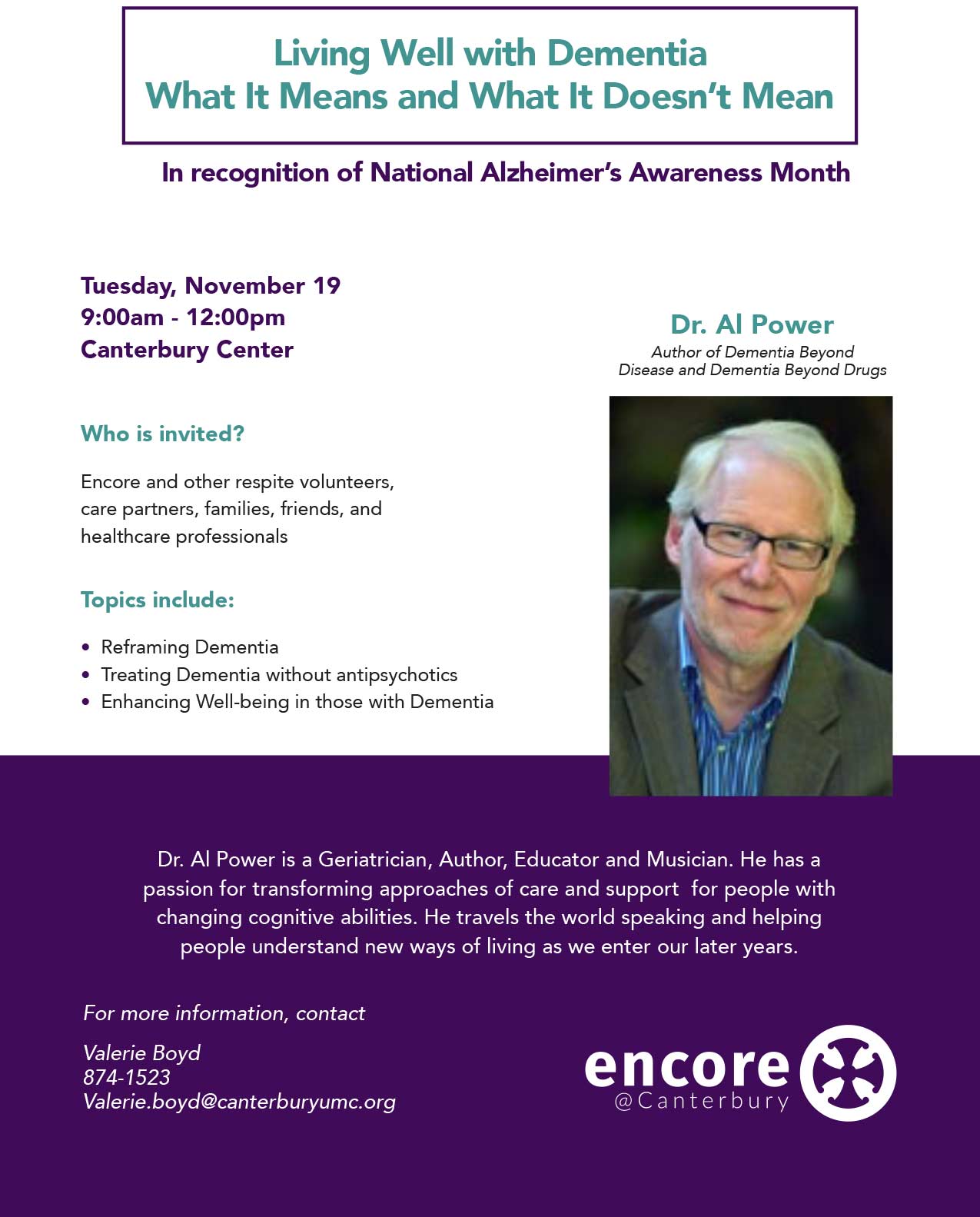In 1983, President Ronald Reagan designated November as National Alzheimer’s Disease Awareness Month. At the time, fewer than 2 million Americans had Alzheimer’s and related neurodegenerative diseases; today, the number of people with these diseases has soared to over 5.8 million in the US alone, with a new diagnosis every 65 seconds. November also marks National Family Caregivers Month. This year 16.1 million family caregivers will provide an estimated 18.5 billion hours of difficult, selfless, and unpaid care for loved ones living with dementia with a financial value of more than $234 billion.
Be a part of Alzheimer’s Awareness Month by participating in Alzheimer’s of Central Alabama’s Walking to Remember, Saturday, November 2, inside the Riverchase Galleria, 8 am. Join with family and friends to Shine a Light on Alzheimer’s at this fun 3 mile indoor walk (or a distance that suits you). Walk in honor of memory of your loved one. Walkers raising a minimum of $50 receive a t-shirt. https://alzca.org/walking/ for more info.
Kirkwood by the River Chile Cook Off benefiting Alzheimer’s of Central Alabama, Friday, November 8, 11 – 1. See attached flyer. www.kirkwoodbytheriver.com or (205) 956-2184.
Statewide Day of Prayer and Remembrance, Sunday, November 10.
Homewood Cumberland Presbyterian Church will host the Rev. Dr. Cynthia Huling Hummel for Sunday school and worship on Sunday, November 10, in honor of the Day of Prayer. Perhaps we can best learn about Alzheimer’s from someone living with the diagnosis. Click to read Rev. Dr. Cynthia Huling Hummel’s essay, “A Green Pentecost: On Pastoring with Alzheimer’s,”
https://collegevilleinstitute.org/bearings/a-green-pentecost-on-pastoring-with-alzheimers/
Alzheimer’s of Central Alabama Annual Meeting and Candle Lighting Service, Thursday, November 14, Vestavia Hill Library, 6 – 7:30. Daniel C. Potts, MD, FAAN, will explore lessons he learned through his care partnership with his late father, Lester that transformed his life and medical practice. A Tuscaloosa neurologist and former ACA board member, Dr. Potts practices neurology at the Tuscaloosa VA Medical Center. Along with his wife, Ellen W. Potts, MBA, he authored A Pocket Guide for the Alzheimer’s Caregiver. Join us to hear, “Souls Shine Forth: Sharing the Light Of Personhood Through Relationships In Dementia Care”.
Virtual Dementia Tour, November 15, 9 – 2. Cooper Green Mercy Health Services, 1515 6th Avenue South. Sponsored by the Jefferson County Community Services & Workforce Development Senior Services Division. Call Dedra Lewis, 205-325-5567.
Pancake breakfast benefiting Alzheimer’s of Central Alabama, Friday, November 15, St. Martin’s.
Crimson Community Café, at UPerk in Tuscaloosa, Saturday, November 16, 10 – 11:30. Bring your loved one with dementia for refreshment, music and fellowship. Email crimsoncummunitycafe@gmail.org
Living Well with Dementia, workshop with Dr. Al Power who wrote Dementia Beyond Drugs and Dementia Beyond Disease, Tuesday, November 19, at Canterbury United Methodist Church, 9 – noon. Contact Valerie Boyd at (205) 874-1523 or valerie.boyd@canternuryumc.org.
One Enchanted Day for Caregivers, a free event for unpaid family caregivers, Saturday, November 21, Ridgecrest Baptist Church, Tuscaloosa, 11:30 – 2. www.westalabamaaging.org/oneenchantedday
News to know:
Loving Through Dementia is a wonderful new website from Due West United Methodist Church. It’s FULL of great suggestions and links to some of the best resources available for initiating or expanding Dementia Friendly Faith Communities and programs as well as offering practical support for families and caregivers. http://lovingthroughdementia.org/actionplan.html
An October 30, 2019 Richland Source article addressed potential difficulties caused by daylight savings for people with dementia who are experiencing sundowning. As darkness arrives earlier, schedules may need to be adjusted to accommodate. Recommendations include scheduling outside activities early in the day, making lunch the main meal, and keeping the home well-lit.
“Most likely, Alzheimer’s disease will turn out to be a cluster of diseases with slightly different initiators, accelerators, and exacerbators with no single cause or trigger,” according to Tetsu Maruyama, Chief Scientific Advisor of the Dementia Discovery Fund. An October 29, 2019 BioSpace articlelooked at current thinking in the Alzheimer’s disease drug pipeline, especially in light of Biogen and Eisai’s recent decision to seek FDA approval for aducanumab. Much of the industry has already pivoted away from anti-amyloid treatments, looking in the directions of tau, inflammation and environmental factors.
The A-LIST Pulse of the Community Fall 2019 Issue Brief presents “What Matters Most” findings on dementia’s effects on travel and ‘loss of self’ feelings. “A new UsAgainstAlzheimer’s A-LIST® survey shows how Alzheimer’s disease can be isolating, with both people with dementia and caregivers cutting back their travels and vacations because of concerns about traveling with the disease, and whether the costs of vacation would lead to less money for future care costs. This survey provides key insights at a time when millions of families are making plans for one of the nation’s busiest travel periods: Thanksgiving through New Year’s. At the same time, in a new “loss of self” A-LIST® survey, about three-quarters of those living with the disease, caregivers and others concerned about brain health talk about their loss of independence and control over daily activities from a diagnosis, and two-thirds talk about challenges of isolation and the loss of a social life.”
According to Dr. Alireza Atri, Director of the Banner Sun Health Research Institute in Arizona: “Our analysis strongly supports that current estimates fail to recognize the true costs of the diseases, such as Alzheimer’s. Some studies have estimated that out of pocket expenses for people with dementia are up to one third of their household wealth in the final five years of their life, and that caregivers have health care costs that are twice as high as non-caregivers. We also found evidence that costs begin rising up to 10 years prior to diagnosis.” Alzheimer’s disease and other forms of dementia are estimated to cost $290 billion dollars a year in the United States, and more than a trillion dollars worldwide, making it one of the costliest diseases for society at large… READ MORE
An October 29, 2019 The Hill opinion piece, referenced the recent Milken Report (in collaboration with UsAgainstAlzheimer’s, AARP and Bank of America) highlighting in particular the disproportionate impact of dementia on women. “Increased participation by women in clinical trials has helped us understand why more women than men have dementia… New studies have linked it to biological differences, such as hormonal imbalances, that change brain chemistry. With no cure in sight, we must double our efforts to reduce the risk and cost of dementia… That is why we are making recommendations to improve brain health, reduce gender and racial disparities, and ultimately change the trajectory of this devastating disease.”
A new report from the National Association of Area Agencies on Aging (n4a) illustrates how Area Agencies on Aging (AAAs)are responding to the needs of increasing numbers of individuals living with dementia and their caregivers—and how they are addressing the issue of brain health in their communities. The new report, Dementia and Brain Health: The Role of Area Agencies on Aging, examines the impact of dementia on AAA clients, as well as the innovative programs and partnerships AAAs have developed to support the growing number of individuals living with dementia and their caregivers.
Delay in Hearing Aids Can Mean More Than Hearing Trouble: Hearing loss can lead to changes in the brain. READ MORE
Can Any Good Come From Alzheimer’s? Some find that relationships among family members heal and deepen READ MORE
An October 22, 2019 Congresswoman Maxine Waters press release urged increased spending for Alzheimer’s disease research at the National Institutes of Health. Waters and Congressman Chris Smith wrote, “The Senate provided a $350 million increase in funding for Alzheimer’s research at the National Institutes of Health (NIH) for a total appropriation of $2.818 billion in FY 2020 for Alzheimer’s Disease including Alzheimer’s Disease Related Dementias (AD/ADRD)….The Senate also provided $10 million for the implementation of the BOLD Infrastructure for Alzheimer’s Act (P.L. 115-406) in FY 2020, which was passed by Congress last year with strong bipartisan support….We therefore urge you to accede to the Senate’s proposed funding levels for these two critical accounts and provide at least $10 million for the BOLD Act and a total of $2.818 billion for Alzheimer’s Disease including Alzheimer’s Disease Related Dementias (AD/ADRD) in FY 2020.”
Did you know? Planet Fundraiser is an app that lets you give back to non-profits, schools, and groups simply by taking a picture of receipts from merchants you already shop at. You shop and participating merchants donate to the charity of your choice. To date almost $1600 has been donated to ACA.




You must be logged in to post a comment.